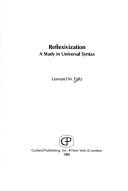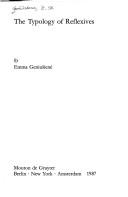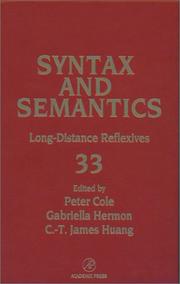| Listing 1 - 8 of 8 |
Sort by
|
Dissertation
Year: 1986 Publisher: [Dordrecht : ICG Printing,
Abstract | Keywords | Export | Availability | Bookmark
 Loading...
Loading...Choose an application
- Reference Manager
- EndNote
- RefWorks (Direct export to RefWorks)

ISBN: 0824054806 Year: 1985 Publisher: New York Garland
Abstract | Keywords | Export | Availability | Bookmark
 Loading...
Loading...Choose an application
- Reference Manager
- EndNote
- RefWorks (Direct export to RefWorks)
Grammar --- Grammar, Comparative and general --- Universals (Linguistics) --- Constructions réfléchies (Linguistique) --- Syntaxe --- Universaux (Linguistique) --- Reflexives --- Syntax --- Linguistic universals. --- Constructions réfléchies (Linguistique)

ISBN: 089925084X Year: 1987 Volume: 2 Publisher: Berlin : Mouton de Gruyter,
Abstract | Keywords | Export | Availability | Bookmark
 Loading...
Loading...Choose an application
- Reference Manager
- EndNote
- RefWorks (Direct export to RefWorks)
Book
ISBN: 9783110251340 9783110251357 3110251353 3110251345 128288526X 9786612885266 3112191919 Year: 2010 Volume: 537 Publisher: Berlin De Gruyter
Abstract | Keywords | Export | Availability | Bookmark
 Loading...
Loading...Choose an application
- Reference Manager
- EndNote
- RefWorks (Direct export to RefWorks)
Dieses Buch widmet sich der diachronen Entwicklung von Valenzalternationen, d.h. der Verwendung eines Verbs in verschiedenen syntaktischen Konstruktionen. Wie entstehen neue Mittel des formalen Ausdrucks der Alternationen, wie breiten sich diese neuen Mittel aus und welche sind die Auswirkungen der Entstehung und Ausbreitung auf bereits bestehende Mittel? Diese Fragen werden im vorliegenden Buch anhand der Entwicklung der französischen Kausativ-Antikausativ-Alternation behandelt.
French language --- Grammar --- Causative. --- Reflexives. --- Verb. --- Grammar, Historical. --- Langue d'oïl --- Romance languages --- Changement linguistique --- Grammaire de dépendance --- Causatif (linguistique) --- Constructions réfléchies (linguistique) --- Linguistics. --- Romance Studies. --- Semantics. --- Syntax. --- Valency. --- Grammaire de dépendance --- Constructions réfléchies (linguistique)
Book
ISBN: 9789027205940 9789027273673 9027273677 9027205949 1280690216 9786613667151 9781280690211 6613667153 Year: 2012 Volume: 127 Publisher: Amsterdam Benjamins
Abstract | Keywords | Export | Availability | Bookmark
 Loading...
Loading...Choose an application
- Reference Manager
- EndNote
- RefWorks (Direct export to RefWorks)
While French reflexive clitics have been widely studied, other forms of expressing co-reference within the clause have not received much attention. This monograph offers a diachronic study of the wider system of clause-mate co-reference in French, including the stressed pronouns, their suffixed form {soi/lui/elle}-même, and also the intensifier use of the latter. Its empirical backbone is a corpus analysis of the gradual replacement of stressed reflexive soi with the personal pronoun lui/elle from Old to Modern French. Apart from offering insights into the history of the l
French language --- Historical linguistics --- Grammar --- Grammar, Comparative and general --- Reflexives. --- History. --- Langue d'oïl --- Romance languages --- Reflexives (Grammar) --- Reflexivity (Grammar) --- Reflexivization (Grammar) --- Pronoun --- Reciprocals --- Verb --- Linguistics --- Philology --- Français (langue) --- Grammaire comparée --- Histoire --- Constructions réfléchies (linguistique) --- Français (langue) --- Grammaire comparée --- Constructions réfléchies (linguistique)
Book
ISBN: 9783110195941 Year: 2008 Volume: 192 Publisher: Berlin Mouton de Gruyter
Abstract | Keywords | Export | Availability | Bookmark
 Loading...
Loading...Choose an application
- Reference Manager
- EndNote
- RefWorks (Direct export to RefWorks)
Grammar --- Grammar, Comparative and general --- Réciproques (Linguistique) --- Constructions réfléchies (Linguistique) --- Reciprocals. --- Reflexives. --- 800 --- 801.5 --- Taalwetenschap. Taalkunde. Linguistiek --- Grammatica --- 801.5 Grammatica --- 800 Taalwetenschap. Taalkunde. Linguistiek --- Réciproques (Linguistique) --- Constructions réfléchies (Linguistique) --- Reciprocals (Grammar) --- Reflexives (Grammar) --- Reflexivity (Grammar) --- Reflexivization (Grammar) --- Reciprocals --- Reflexives --- Pronoun --- Verb --- Linguistics --- Philology

ISBN: 0126135339 1849508747 058549228X 9780585492285 9781849508742 9780126135336 Year: 2001 Volume: 33 Publisher: San Diego, Calif. Academic Press
Abstract | Keywords | Export | Availability | Bookmark
 Loading...
Loading...Choose an application
- Reference Manager
- EndNote
- RefWorks (Direct export to RefWorks)
This new volume serves to focus and clarify the debate surrounding long-distance reflexives by examining the role of syntax, semantics, and pragmatics/discourse in the use of long-distance reflexives in a variety of languages. Graduate students, upper class undergraduates, theoretical linguists, computational linguists, psycholinguists, and linguists at large will find this an important tool. Syntacticians, as well as specialists in language acquisition and processing, will find the volume central to their work. The book is also of great value to those interested in Asian languages, especially Chinese. It will serve as primary reading material for seminars on anaphora. Among its key features, it: discusses a broad range of questions about syntactic categories; and presents a number of theoretical frameworks.
Grammar --- Pragmatics --- Grammar, Comparative and general --- Government-binding theory (Linguistics) --- Constructions réfléchies (Linguistique) --- Théorie du liage et du gouvernement (Linguistique) --- Reflexives --- Anaphora (Linguistics) --- -Comparative grammar --- Grammar, Philosophical --- Grammar, Universal --- Language and languages --- Philosophical grammar --- Linguistics --- Philology --- Binding theory (Linguistics) --- Government and binding (Linguistics) --- Generative grammar --- Cross-reference (Linguistics) --- Reference (Linguistics) --- Grammar, Comparative --- -Reflexives --- -Binding theory (Linguistics) --- Comparative grammar --- Constructions réfléchies (Linguistique) --- Théorie du liage et du gouvernement (Linguistique) --- Reflexives (Grammar) --- Reflexivity (Grammar) --- Reflexivization (Grammar) --- Pronoun --- Reciprocals --- Verb --- Grammar, syntax. --- Language Arts & Disciplines --- Medical --- Reflexives. --- Grammar & Punctuation. --- Audiology & Speech Pathology.
Multi
ISSN: 17774144 ISBN: 9782853999267 2853999262 9791036561528 Year: 2014 Publisher: Aix-en-Provence : Publications de l'Université de Provence,
Abstract | Keywords | Export | Availability | Bookmark
 Loading...
Loading...Choose an application
- Reference Manager
- EndNote
- RefWorks (Direct export to RefWorks)
Idipsum est une locution qu’Augustin utilise pour désigner Dieu. Elle signifie littéralement « cela même ». Ce minimalisme sémantique ne laisse pas de la rendre mystérieuse. Faut-il y voir un emprunt à certains textes bibliques qui déjà en font usage ? Dans ce cas, idipsum, tel un nom propre vide de toute signification, se bornerait à indiquer Dieu en tant qu’il échappe à toute définition rationnelle. Ou bien faut-il rattacher idipsum à la tradition platonicienne qui recourt à des locutions grecques similaires pour désigner la réalité intelligible qui est « elle-même en elle-même » ? Idipsum serait alors la trace d’un héritage philosophique conduisant Augustin à une définition métaphysique de Dieu comme Être absolu. Cependant, cette alternative entre origine biblique et tradition platonicienne néglige la diversité des usages philosophiques des locutions formées sur auto puis ipsum : elles expriment d’abord l’identité et le fait d’être soi, puis la réflexivité, au croisement des champs dialectique, pratique et ontologique. Cet ouvrage explore la façon dont ces aspects de l’identité se sont construits, du autos grec à l’idipsum latin, à travers des études portant sur Homère, Platon, Aristote, le stoïcisme, le néoplatonisme grec puis latin, Augustin.
Identity (Philosophical concept) --- Greek language --- Latin language --- Philosophy, Ancient --- Grammar, Comparative and general --- Identité --- Grec (Langue) --- Latin (Langue) --- Philosophie ancienne --- Constructions réfléchies (Linguistique) --- Terms and phrases --- Reflexives --- Mots et locutions --- Identité (philosophie) --- Néoplatonisme --- Stoïcisme --- Grec (langue) --- Latin (langue) --- Augustin, --- Aristote (0384-0322 av. J.-C.) --- Aristote, --- Platon, --- Homère, --- Personnages --- Identité --- Constructions réfléchies (Linguistique) --- 276 =71 AUGUSTINUS:1 --- 276 =71 AUGUSTINUS:1 Latijnse patrologie-:-Filosofie. Psychologie--AUGUSTINUS --- 276 =71 AUGUSTINUS:1 Patrologie latine-:-Filosofie. Psychologie--AUGUSTINUS --- Latijnse patrologie-:-Filosofie. Psychologie--AUGUSTINUS --- Patrologie latine-:-Filosofie. Psychologie--AUGUSTINUS --- Aristote --- Néoplatonisme. --- Stoïcisme. --- Mots et locutions. --- Autos (The Greek word) --- Idipsum (The Latin word) --- Self (Philosophy) --- Philosophers, Ancient --- History --- Language --- Platon --- Philosophy, Ancient. --- Philosophy --- Ancient philosophy --- Greek philosophy --- Philosophy, Greek --- Philosophy, Roman --- Roman philosophy --- Ancient philosophers --- Identity --- Comparison (Philosophy) --- Resemblance (Philosophy) --- Id ipsum (The Latin word) --- Language. --- Etymology --- idipsum --- Dieu --- tradition platonicienne --- autos
| Listing 1 - 8 of 8 |
Sort by
|

 Search
Search Feedback
Feedback About UniCat
About UniCat  Help
Help News
News